WEEK 1: 5– 9 Feb. 2018
Dear all,
Please find the updates and news for this week below.
1. Training by Dr. Simon Phipps
We had the great pleasure to have Dr. Simon Phipps, Teacher Training Consultant Director, ATI (Anatolia Training Institute) at our school as a part of continuing professional development activities. With the two-day training given by Simon Phipps we had the opportunity to focus on how our beliefs shape our teaching, our needs and demands as well as issues in vocabulary teaching. We hope we all benefitted from the opportunity to have some quality time to reflect on what we have been doing, to listen to each other and to share our valuable ideas during these two days.
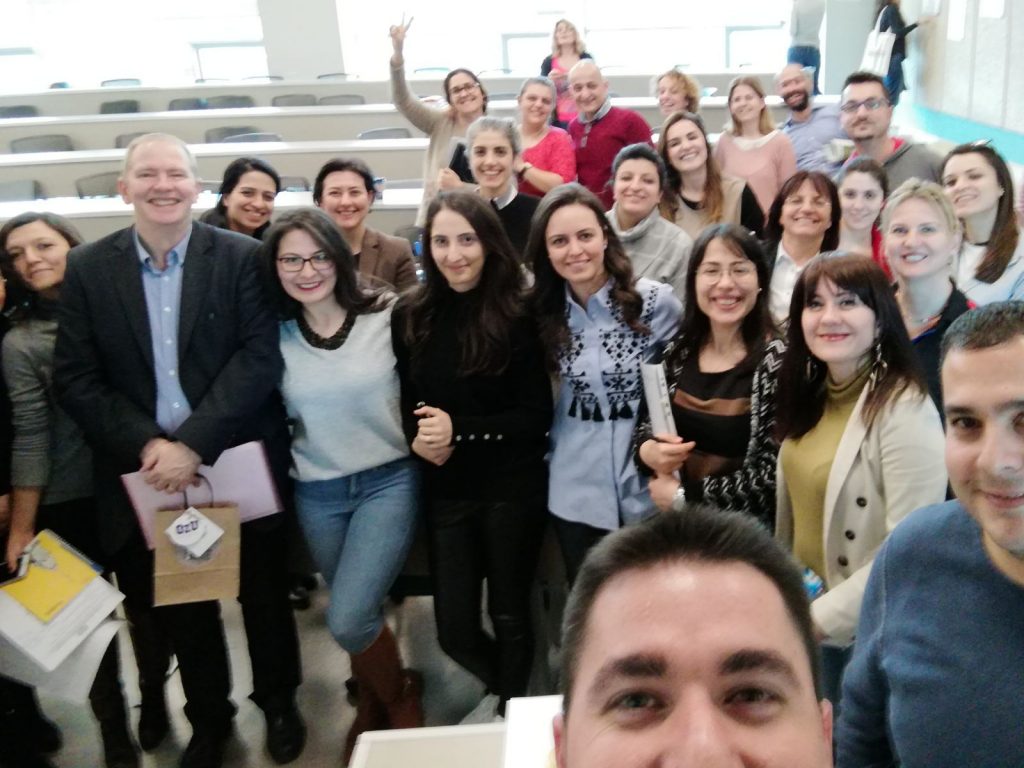
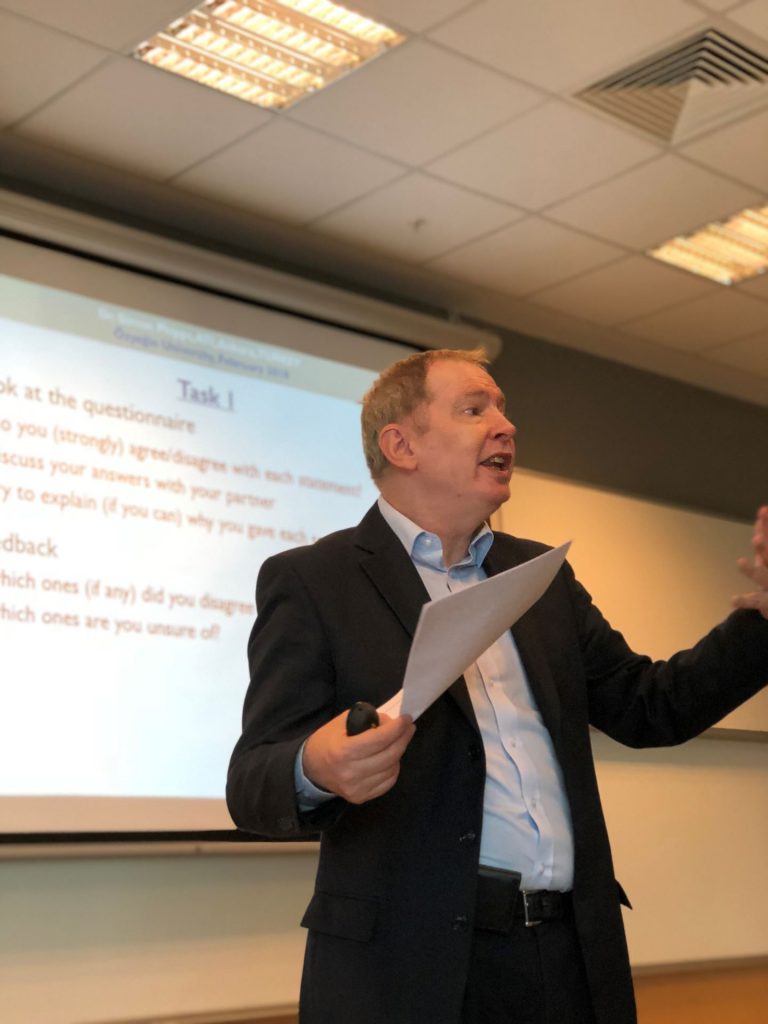
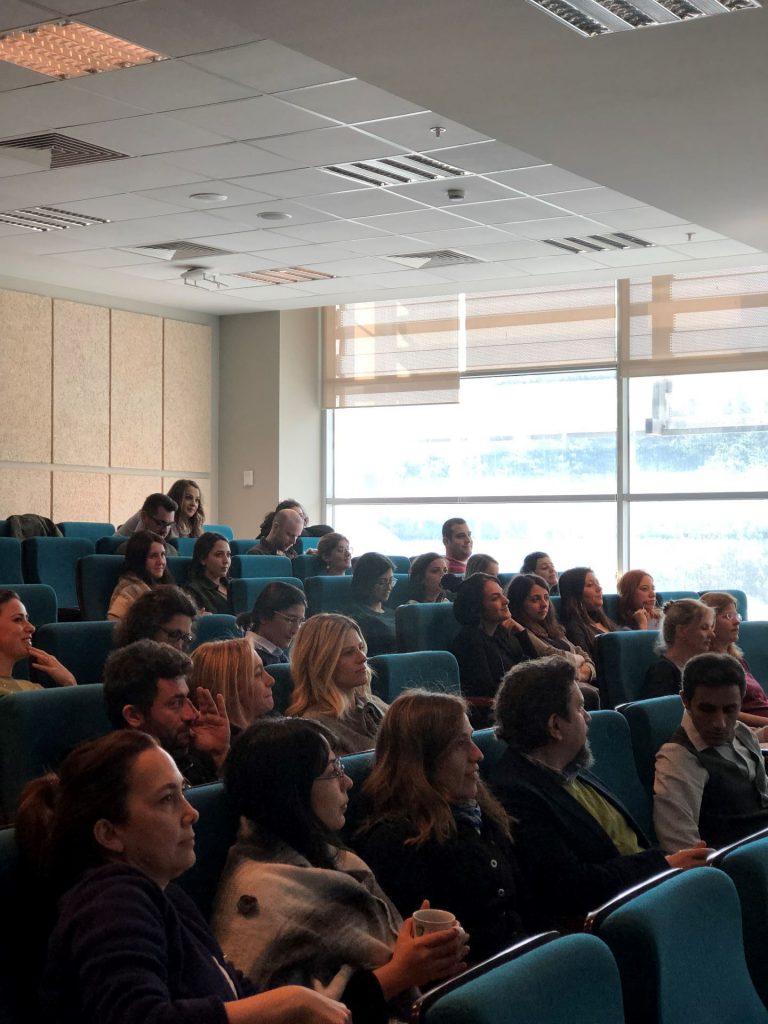
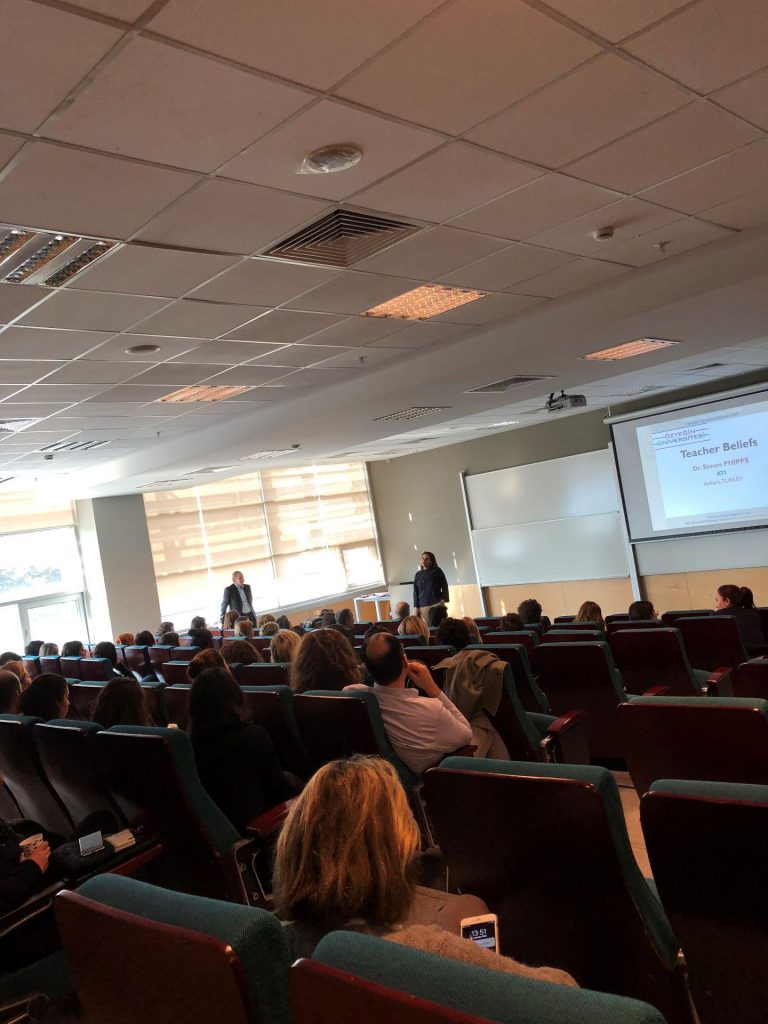
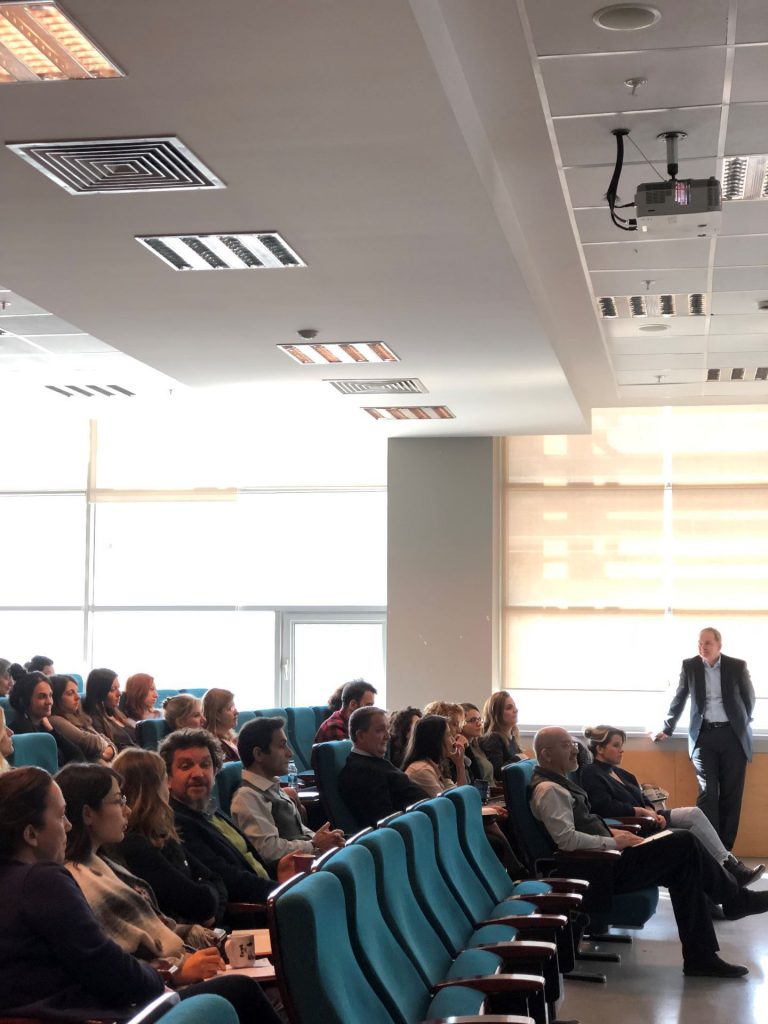
2. UGE Sharing Experience (Shaexperience) Workshop and Presentation Series Spring 2018
UGE instructors conducted their Shaexperience sessions during their prep day. You can find some photos and the details of the sessions.
1 Ahmet Çelik: EFL Teachers’ Research Engagement

The main aim of this study is to find research engagement level of English as Foreign Language (EFL) teachers at Ozyegin University by reading published academic materials in the literature or doing teacher research, and the motives behind this engagement level. In addition, the research culture of the institution’s relevant department, and how teachers perceive this culture was also aimed to be reported at the end of the study. Lastly, apart from the institutional research culture, EFL teachers’ perception regarding what research is another issue addressed by the study.
2 Aslı Sağlam-Source-based Writing Assessment
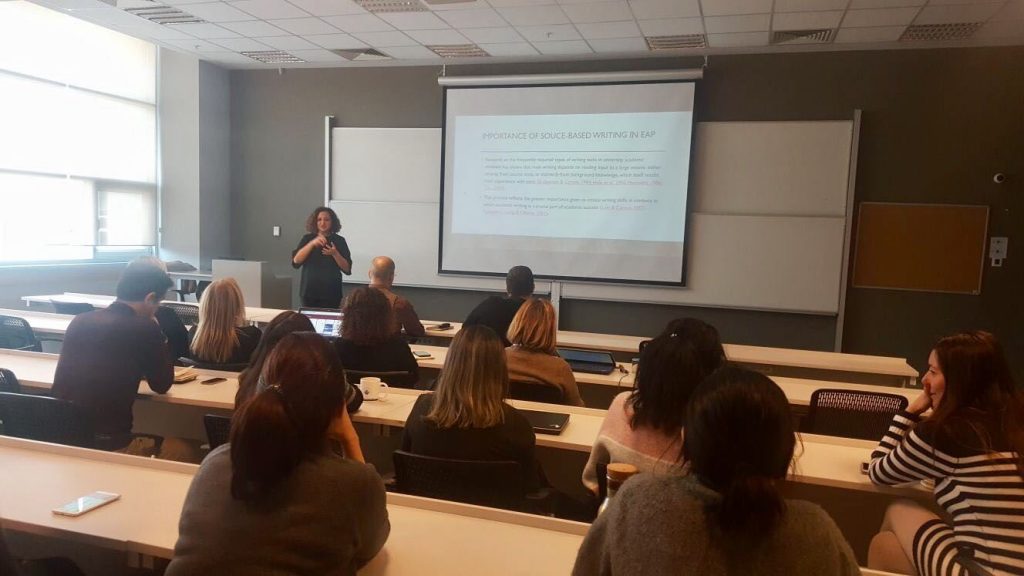
In this session I intend to share my intake and reflections of the workshop on source-based writing assessment given by Prof. Dr. Atta Gebril (Applied Linguistics, The American University of Cairo) at EALTA Special Interest Groups (Assessment of Writing and Assessment for Academic Purposes) event conducted at the University of Bremen, Germany. Some of the key issues around task design, scoring of integrated writing assessments and potential implications of these assessment tasks for the UGE context will be reviewed. Finally ideas for research will be discussed.
3. Mahir Sarıgül: Native English-speaking teachers in foreign language teaching in Turkey: a brief historical overview
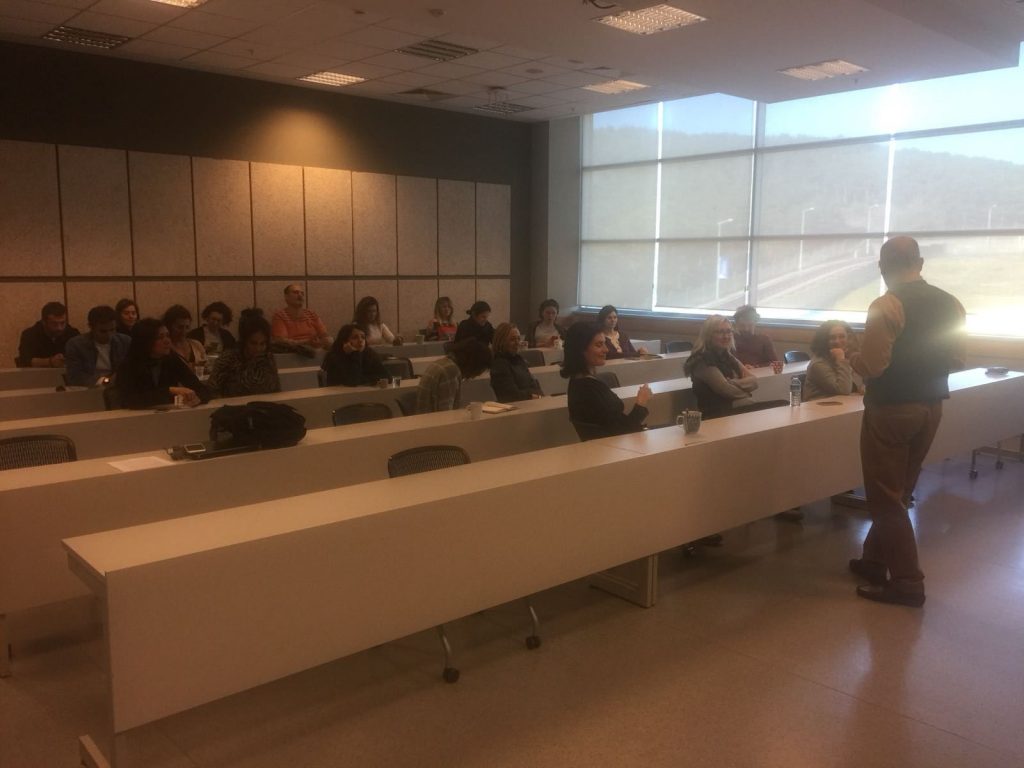
With the onset of globalisation, the world is turning into a global village and the need for a common language has become pressing. Increasingly, English has assumed this role as more and more people have begun to use it as an effective crosscultural communication tool. As the demand for learning English has increased, so has the number of lucrative job opportunities for English language teachers, especially native speakers, in the non-English-speaking parts of the world; indeed, in many such countries, teaching English has become a multi-billion dollar industry. This study attempts to introduce the journey of native English-speaking teachers and a historical overview of foreign language teaching in Turkey.
4. Saniye Çancı Çalışaneller: Death in the Fifth Position: A Detective Novel by Gore Vidal
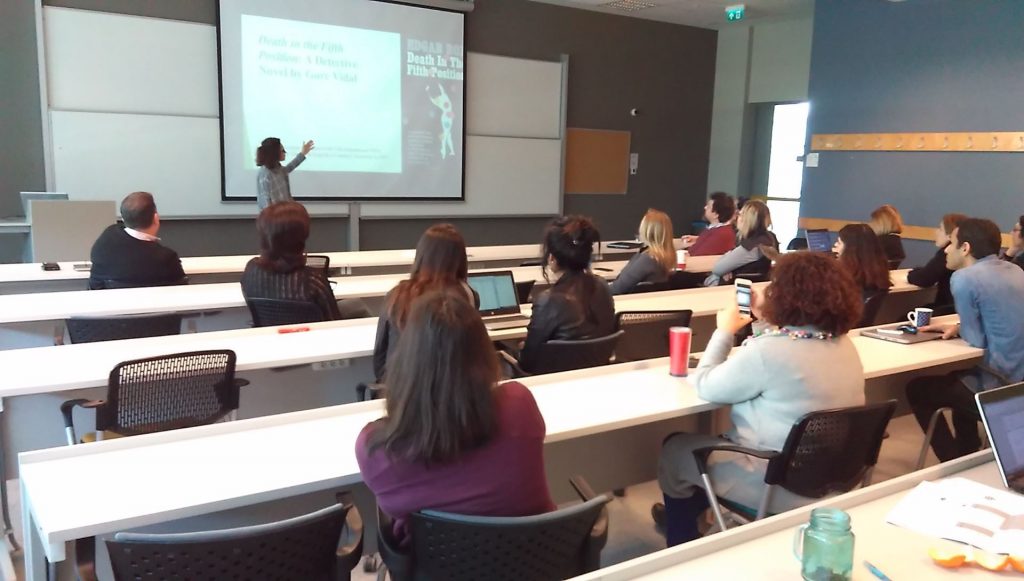 In 1948, Gore Vidal published The City and the Pillar, a novel about same-sex relationships. Even though “[B]y today’s standards it is tame and discreet,” the novel was considered to be a “scandal” and “denounced” back then (McGrath, 2012, para. 17), and The New York Times stopped reviewing Vidal’s books. In the 1950s, Gore Vidal wrote three detective novels under the pseudonym of Edgar Box: Death in the Fifth Position (1952), Death Before Bedtime (1953), and Death Likes It Hot (1954). The publication of the novels is significant and timely because each of these novels turns out to be a comment on political and social issues as well as on sexuality. By focusing on Death in the Fifth Position, the first book in the Edgar Box series, this study will attempt to unearth the ways in which detective fiction has become a proper genre for Vidal to make his controversial voice heard after he was blacklisted upon the publication of The City and the Pillar.
In 1948, Gore Vidal published The City and the Pillar, a novel about same-sex relationships. Even though “[B]y today’s standards it is tame and discreet,” the novel was considered to be a “scandal” and “denounced” back then (McGrath, 2012, para. 17), and The New York Times stopped reviewing Vidal’s books. In the 1950s, Gore Vidal wrote three detective novels under the pseudonym of Edgar Box: Death in the Fifth Position (1952), Death Before Bedtime (1953), and Death Likes It Hot (1954). The publication of the novels is significant and timely because each of these novels turns out to be a comment on political and social issues as well as on sexuality. By focusing on Death in the Fifth Position, the first book in the Edgar Box series, this study will attempt to unearth the ways in which detective fiction has become a proper genre for Vidal to make his controversial voice heard after he was blacklisted upon the publication of The City and the Pillar.
5. Bedra G. Şenol: Oldies but Goldies?
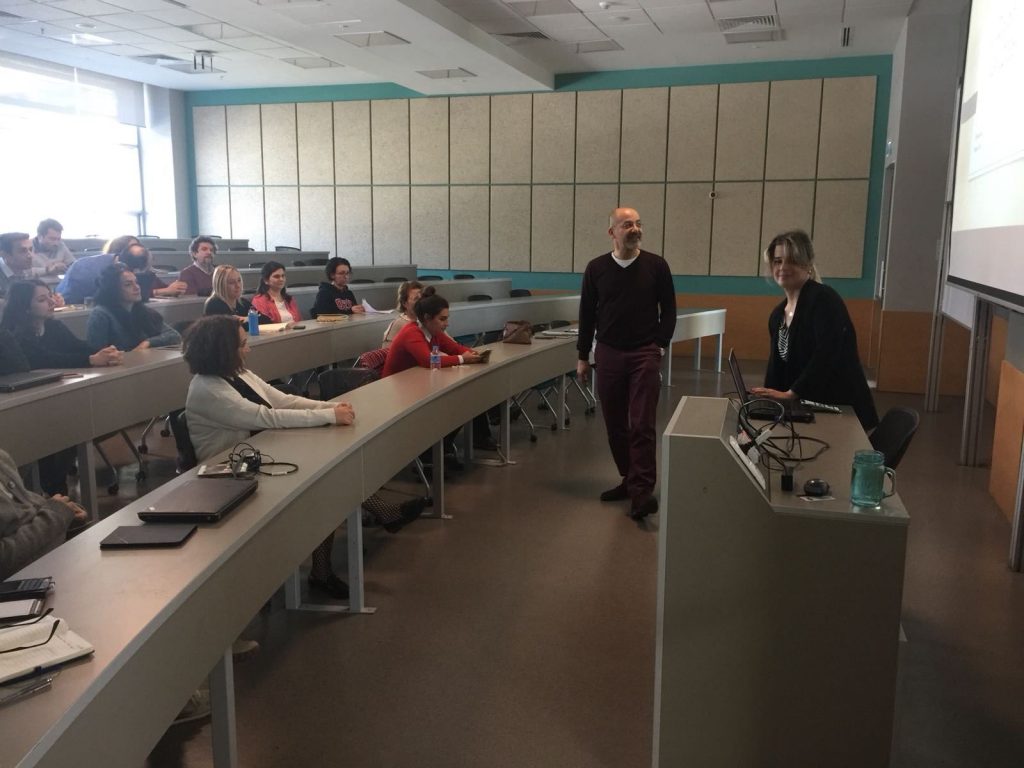
We as language Teachers strive to adapt new technologies and modern teaching methods to our classroom. However, there might be cases when we need to take a relook into our current “modern” teaching methods and revisit old teaching styles. The presenter will share her experience with a group of “technologically illiterate” students and encourage discussion among instructors about the benefits or disadvantages of applying old teaching methods in a modernised atmosphere.
3. Study Center
The overview of 2017-2018 Fall Semester
The number of visits: In Fall Semester, we had 291 visits (A2-141, B1-41, B2-53, Pending-52, 1-Law, 2-Architecture, 1-International Relations) and students visited the center with the needs of Writing (155 Visits), Grammar (81 Visits), Vocabulary (23 Visits), Trace Guidance (8 Visits), Listening (13 Visits), Study Skills (20 Visits), Reading (15 Visits), Resources (6 Visits), Speaking (7 Visits) and Other Needs-like Spelling, Diagnostic, Counselling (4 Visits).
Workshops: Writing and Vocabulary were the most common needs that the students visited the center with in the previous years and last semester, as well. Therefore, workshops on those areas were held by Esra Çelik Soydan and Gülşah Tuna Herdem. The number of students attending those workshops were higher compared to last year.
Extra Support: İlknur Sarıoğlu gave extra support to two groups of students last semester. She had extra lessons with YDO students to help them catch up with the program. Also, she gave support to a B1 Classroom to cover one of the grammar objectives of the level.
Resources in the library: The shelves in the library have been organized in a more student friendly way. The shelves have been labelled according to both levels and skills. Gülşah Tuna Herdem started to analyze the books to identify problems such as missing CDs and answer keys. The analysis will continue in Spring semester.
Actions and Priorities for 2017-2018 Spring Semester
Study Center Hours: In spring semester, 8 instructors will be working in the center. The hours are Monday 12:45-16:35, Tuesday 08:40-12:35, Wednesday 08:40-16:35, Thursday 08:40-16:35, Friday 08:40-12:35. Posters will be available in classrooms and on notice boards.
Extra Support: Deniz Bağcı will be giving extra support to B1 students who are in their second year. Details will be shared with those students.
Resources in the library: This semester, resource analysis and improving the quality of the materials in the library will be prioritized since the quality of the materials is one of the issues that both students and instructors complain about.
4. ScOLa Clubs
2017-2018 Spring Semester ScOLa Clubs:
This semester, we continue providing our students at all levels with extra/co-curricular activities. Please see the table below for the detailed info and inform your students accordingly.
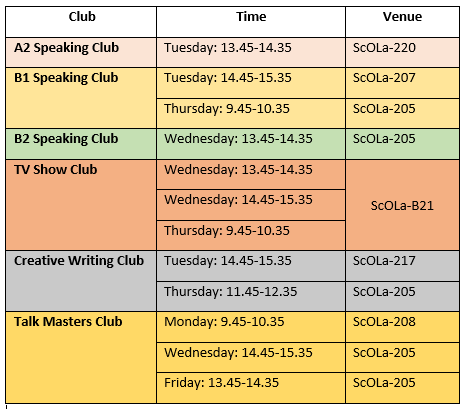 The clubs start in Week 2 and the core teachers will be receiving club posters beforehand.
The clubs start in Week 2 and the core teachers will be receiving club posters beforehand.
5. Cambridge English Webinar-Online resources and digital tools for improving your language knowledge and language ability
What is this webinar about?
Whether you are a native speaker or not, there are always things to learn about the English language. A teacher of English needs a good level of language knowledge and ability in order to be able to provide a good model for learners and to explain the language to them. In this webinar, we’ll discuss issues related to improving your language knowledge and ability, such as setting learning objectives and monitoring progress. We’ll also suggest online resources and digital tools for assessing your current language knowledge and ability, and methods for improving them and getting feedback on your progress.
If you would like to join us for our latest webinar for teachers on Online resources and digital tools for improving your language knowledge and language ability
* Check the times of the webinar where you are
Monday 12 February 2018, 14.00 – 15.00 (UK time)
Wednesday 14 February 2018, 10.00 – 11.00 (UK time)
Registration link: https://events.genndi.com/register/169105139238449461/85558e0beb
6. TED University -MOCA 2018 Event
Engaging the Language Learner within and beyond the Classroom
A concept of growing importance in ELT over the last decade, “learner engagement” is often defined as the time, energy and resources students devote to their learning; hence we, as teachers and students, must continuously reflect on our role to ensure and improve high quality in learning. However, creating relevant, authentic and valuable content within a rich context for the language learner is not always as easy in practice as it seems in theory. Moreover, the multidimensional and changing nature of the term along with the complex demands of the 21st century learners requires a better understanding of what really engages students. Thus we have to make sure that proper mechanisms are activated and right conditions are provided both individually and institutionally to achieve engagement customized for needs of modern learners removing the boundaries of time and space of traditional classroom.
MOCA-2018 aims at bridging between the English Prep Class students and instructors in Turkey to discuss the concept of “learner engagement”, and the challenges and strategies pertaining to it.
Venue:
TED University Campus
Kolej, Ankara
Date & Time:
09:00 – 18:00, Saturday 28th April
REMINDER: 1. Please note that the MOCA-2018 Event will be held in Turkish. Non-Turkish Speaker Colleagues are eligible to apply for participation with another Turkish-Speaking Instructor from the same institution for assistance.
2. Each instructor attends the event with one of his/her students.
The deadline for registration is Friday 02 March 2018.
If you are interested in participating in the event with one of your students, please contact the TLDU by Friday (09.02.2018) 16:30.
Wish all of us a fruitful new module.

Leave a Reply